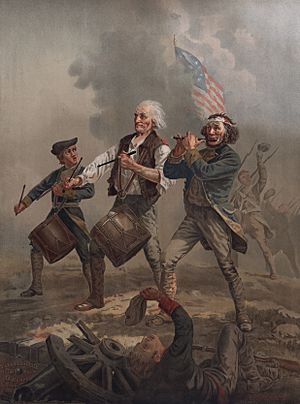Patriot (American Revolution) facts for kids

Patriots were brave colonists in America who wanted to be free from the rule of Great Britain. They are also called Revolutionaries, Continentals, Rebels, or Whigs. These Patriots helped start the American Revolution, which led to the United States becoming an independent country.
Important Patriot leaders worked hard to oppose British rules. They gathered support for the Declaration of Independence, a special document signed on July 4, 1776. This document declared that the colonies were free.
When the American Revolutionary War started in 1775, many Patriots joined the Continental Army. This army was led by George Washington. They fought bravely and won against the British Army. This victory led to the Treaty of Paris in 1783, where Britain recognized the colonies as independent. This is how the United States was formed!
Patriots believed in new ideas from the Age of Enlightenment. They wanted people to have freedom and basic rights. They did not want a king or queens to rule them. Famous Patriot thinkers like Thomas Jefferson, John Adams, and Thomas Paine helped spread these ideas in America.
At that time, slavery existed in all the colonies. This was a complex issue that divided Patriots. Some believed slavery should end, while others did not.
Patriots came from all walks of life and different backgrounds across the colonies. Support for them was strongest in the New England Colonies and less strong in the Southern Colonies. The Revolution split people into three main groups: Patriots (who wanted independence), Loyalists (who wanted to stay with Britain), and those who stayed neutral. African Americans also took sides; those who supported the Patriots were called Black Patriots.
Contents
Understanding the Names: Patriots and Loyalists
Before the Revolution, people who disagreed with British rules in the Thirteen Colonies sometimes called themselves "Whigs." This name came from a political group in Britain. Interestingly, the word "patriot" itself sometimes had a negative meaning back then. Some people used it to describe someone who caused trouble for the government.
Colonists who supported British rule were often called "Tories" or "royalists." During the war, they became known as Loyalists. After the war, some Loyalists moved to Canada, where they were called United Empire Loyalists. Most Loyalists, about 85%, stayed in the new United States and became American citizens.
Who Were the Patriots?
Many Patriots were part of groups like the Sons of Liberty before the war officially began. The most famous Patriot leaders are known today as the Founding Fathers. These were the 56 men who signed the Declaration of Independence in Philadelphia.
Patriots came from all parts of society in the Thirteen Colonies. About 40-45% of the white population supported the Patriots. Around 15-20% supported the Loyalists, and the rest tried to stay out of the conflict. Most Loyalists stayed in the colonies, but some moved to places like Canada or Great Britain.
Why Did People Become Patriots?
Historians have studied why some colonists became Patriots and others remained Loyalists. Generally, Patriots wanted more control over their own lives and believed the British government was unfair. Loyalists, on the other hand, felt a strong duty to the King and believed resisting him was wrong.
Key Differences in Beliefs
- Self-Governance: Patriots believed the colonies should govern themselves. They felt the British government was taking away their rights as Englishmen.
- Taxes: A major reason was taxes. Patriots famously used the slogan "No taxation without representation!" This meant they believed they should not pay taxes to the British Parliament because they had no representatives there to speak for them. The British argued that Parliament represented everyone in the Empire, even those without direct representatives.
- Change vs. Tradition: Loyalists often preferred to keep things as they were and were cautious about big changes. Patriots were eager for change and believed it was time to act for independence.
- Fear of Disorder: Some Loyalists worried that breaking away from Britain would lead to chaos or a new kind of unfair rule. Patriots were confident they could build a better, fairer government.
For a long time, the colonies had managed many of their own affairs, a period sometimes called "salutary neglect". When Britain started imposing more taxes and rules after the French and Indian War, Patriots felt their freedom was threatened. Some Patriots protested very strongly against tax collectors, making those jobs risky.
Related pages

